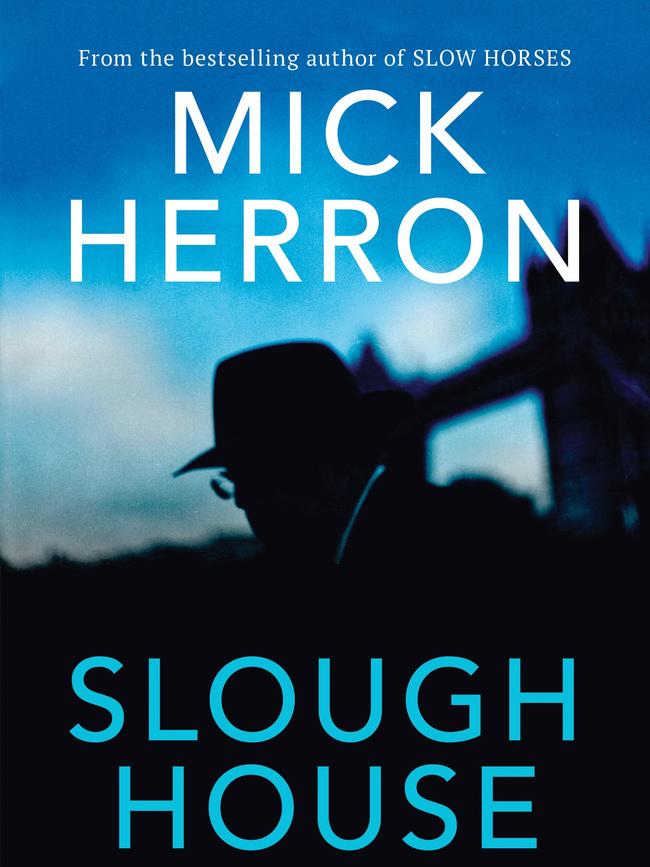Slough House, Mick Herron: suspicion, vengeance lurk in shadows
Life has become far more interesting but much more dangerous in the seventh novel in Mick Herron’s Slough House series.

The sheer boredom of a spy’s craft was underlined by Somerset Maugham in Ashenden, his classic novel of the espionage genre. Tedium is the inevitable companion of the agent.
But as Mick Herron emphasises in his engrossing new novel, Slough House (John Murray, 275pp, $32.99), the discarded agents sent to Slough House by the British secret service, known forever after as slow horses, are forced to face overwhelming boredom in a bid to encourage them to quit.
But something is happening in the universe of the slow horses, in this, the seventh novel in the series. Life has become far more interesting but much more dangerous.
Someone is tailing them throughout London. Perhaps it’s an exercise run by the real spies of Regent’s Park? Perhaps not. However, simultaneously, Slough House has been wiped from the computerised register of the Service. They no longer exist. Finally, existentially someone is murdering the slow horses who have retired.
The boredom at Slough House comes courtesy of the dictatorial Jackson Lamb: dishevelled and dirty in appearance; deplorable and disgusting in personal behaviour. But as Lamb demonstrates again, he is a fierce opponent and can be deadly in the close quarter.
The other side of British espionage is represented by ‘‘Lady Di’’ Taverner, the First Desk at Regent’s Park and the leading light in British Intelligence.
While Jackson Lamb is surprisingly loyal to his ‘‘Joes’’ (failed agents), Lady Di is loyal primarily to herself and is utterly ruthless in terms of seeking further advancement.
This determination has led her to a potentially fatal mistake, for she has supped with one Peter Judd, a transparently insincere former MP and perennial intriguer.

Taverner has accepted private sector money for a very wet operation: the killing of a female Russian agent of the GRU (Russian Military Intelligence) in Kazan. This is retribution for a Novichok attack by the Russians in the UK. This is a feature of Slough House, references are made to real events and people as background to a persuasive fiction.
Ostensibly, the source of the funds that enabled Taverner to launch the hit without reference to her superiors, is Judd, who speaks eloquently at a luncheon where the financial backers are the guests. Judd lays it on with a trowel: “Vengeance, gentlemen – gentlemen and lady – vengeance is an oft maligned impulse. We are told to turn the other cheek, to forgive the wrong that’s done to us. And this is well and good, well and good. But there is a time, too, for anger and chastisement, a time to take up the sword and lay waste those who have done us wrong. That this has now been done is a matter for celebration … ”
Now Herron has fun with the character of Judd, who exhibits an uncanny resemblance to a former mayor of London who is now very senior in British public life.
There are giveaways such as his claim that the number of his children is a matter of public record.
Herron’s villains are worthy of Eric Ambler at his best. The two GRU killers are fine representatives of Kremlin outreach: sadistic in their murderous duty. Their shadows loom large over a novel which is at once absorbing yet at times repelling.
While this is the seventh novel about slow horses, it can be read without any prior knowledge. It is a striking addition to his earlier efforts and he has again created characters who are unique, and scenarios which are convincing.
Morbid humour is interlaced with the tensions intrinsic to spying and much of that humour is to be found upon the sarcastic tongue of Jackson Lamb.
His exchanges with his subordinates and superiors are enormously entertaining.
Slough House, opposite the Barbican, is always a character in Herron’s work. Every ache of its masonry and every complaint of the neglect which it has suffered over the years leaves a mark.
Centrally, Lamb’s office is so filthy it could give rise to another Great Plague. Nothing could be further from the world of M and the sophisticates of other espionage collections.
John Le Carré once observed that survival is an infinite capacity for suspicion. In the Herron novels, suspicion is everywhere and often directed at people who are supposed to be on your team.
This is unsurprising and the source of some of Judd’s money for the hit in Russia is a clarion call for a lack of trust to be the norm, especially among the slow horses.
Stephen Loosley is a senior fellow at the Australian Strategic Policy Institute in Canberra.



To join the conversation, please log in. Don't have an account? Register
Join the conversation, you are commenting as Logout